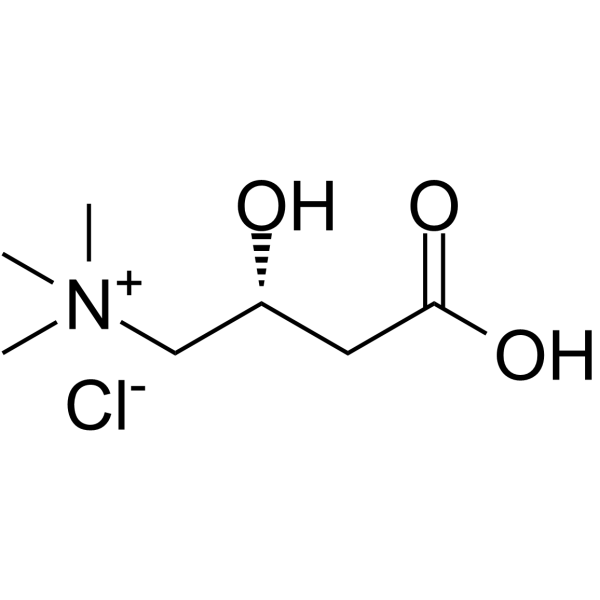All AbMole products are for research use only, cannot be used for human consumption.

L-Carnitine hydrochloride ((R)-Carnitine hydrochloride), a highly polar, small zwitterion, is an essential co-factor for the mitochondrial β-oxidation pathway. L-Carnitine hydrochloride functions to transport long chain fatty acyl-CoAs into the mitochondria for degradation by β-oxidation. L-Carnitine hydrochloride is an antioxidant. L-Carnitine hydrochloride can ameliorate metabolic imbalances in many inborn errors of metabolism.
| Molecular Weight | 197.66 |
| CAS Number | 6645-46-1 |
| Solubility (25°C) | Water 150 mg/mL |
| Storage | 2-8°C, dry, sealed |
[2] Patrick Welsch, et al. Serotonin and noradrenaline reuptake inhibitors (SNRIs) for fibromyalgia
[3] Matthew J Snyder, et al. Treating Painful Diabetic Peripheral Neuropathy: An Update
| Related Metabolite/Endogenous Metabolite Products |
|---|
| D-Tryptophan
D-Tryptophan is the D-isomer of tryptophan, as a non-protein active amino acid, has special physiological properties, can be used as additives, plant growth agents, etc. In the pharmaceutical industry, it is mainly used in the synthesis of various polypeptides, instead of L-tryptophan to extend the peptide half-life. |
| Arachidonic acid sodium salt
Arachidonic acid sodium salt (Sodium Arachidonate) is a polyunsaturated omega-6 fatty acid and a major constituent of biomembranes. Arachidonic acid sodium salt also acts as the substrate for various lipid mediators, such as prostaglandins (PGs). |
| trans-Vaccenic acid
trans-Vaccenic acid is a naturally occurring trans fatty acid (TFA). trans-Vaccenic acid is a precursor for the synthesis of saturated fatty acid in the rumen and of conjugated Linoleic acid (CLA) at the tissue level. trans-Vaccenic acid inhibits nasopharyngeal carcinoma (NPC) cell growth and induces apoptosis through the inhibition of Bad/Akt phosphorylation. |
| Mead acid
Mead acid (5,8,11-Eicosatrienoic acid) is an unsaturated (Omega-9) fatty acid. |
| p-Cresol glucuronide
p-Cresol glucuronide is a metabolite of p-cresol, it is a prototype protein-bound uremic toxin. |
All AbMole products are for research use only, cannot be used for human consumption or veterinary use. We do not provide products or services to individuals. Please comply with the intended use and do not use AbMole products for any other purpose.


Products are for research use only. Not for human use. We do not sell to patients.
© Copyright 2010-2024 AbMole BioScience. All Rights Reserved.
